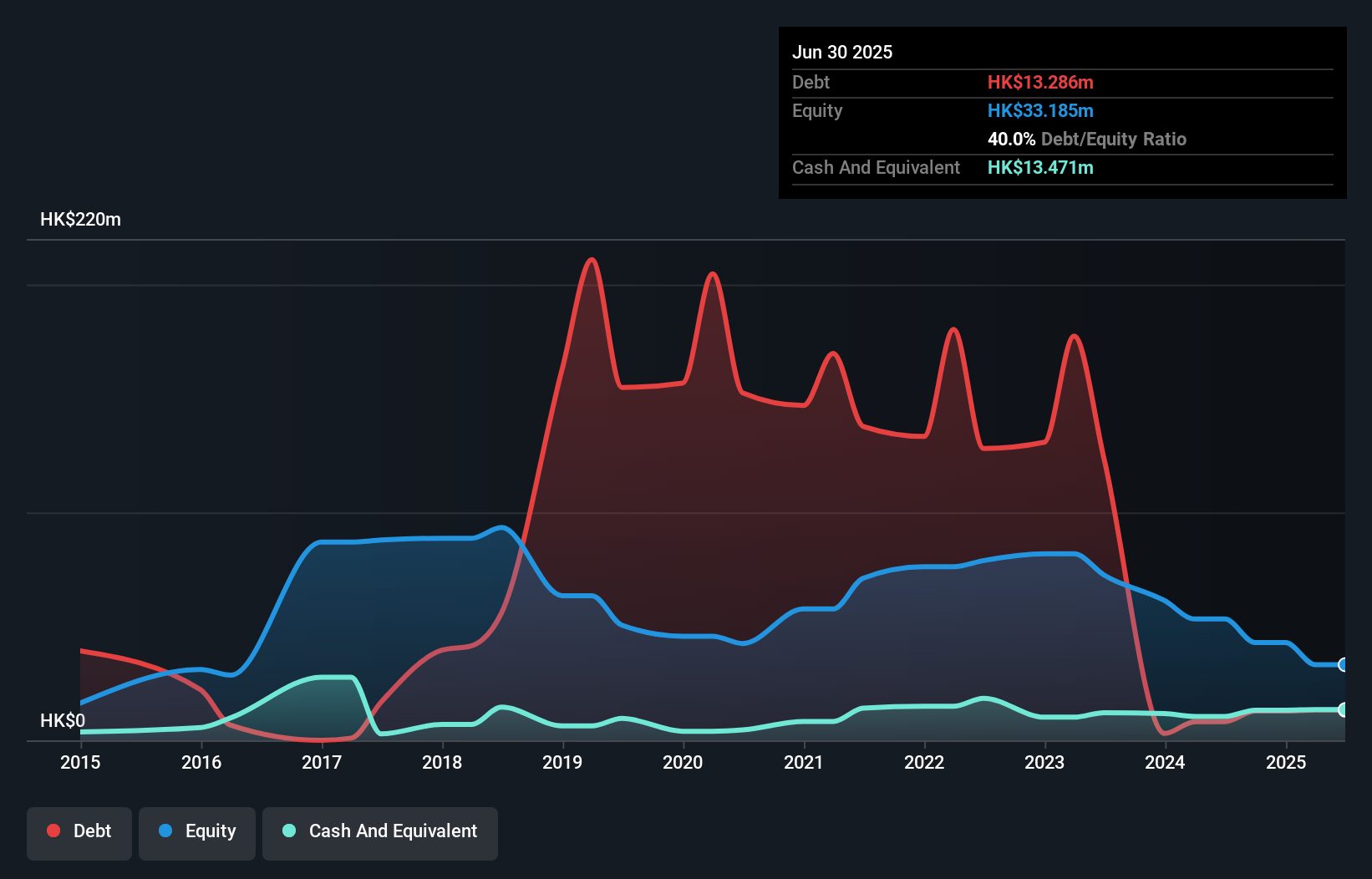David Iben put it well when he said, 'Volatility is not a risk we care about. What we care about is avoiding the permanent loss of capital.' When we think about how risky a company is, we always like to look at its use of debt, since debt overload can lead to ruin. We can see that Janco Holdings Limited (HKG:8035) does use debt in its business. But the real question is whether this debt is making the company risky.
Why Does Debt Bring Risk?
Debt assists a business until the business has trouble paying it off, either with new capital or with free cash flow. If things get really bad, the lenders can take control of the business. However, a more common (but still painful) scenario is that it has to raise new equity capital at a low price, thus permanently diluting shareholders. Of course, the upside of debt is that it often represents cheap capital, especially when it replaces dilution in a company with the ability to reinvest at high rates of return. The first thing to do when considering how much debt a business uses is to look at its cash and debt together.
What Is Janco Holdings's Debt?
The image below, which you can click on for greater detail, shows that at June 2025 Janco Holdings had debt of HK$13.3m, up from HK$8.20m in one year. But on the other hand it also has HK$13.5m in cash, leading to a HK$185.0k net cash position.

A Look At Janco Holdings' Liabilities
According to the last reported balance sheet, Janco Holdings had liabilities of HK$59.3m due within 12 months, and liabilities of HK$18.7m due beyond 12 months. On the other hand, it had cash of HK$13.5m and HK$37.0m worth of receivables due within a year. So its liabilities total HK$27.5m more than the combination of its cash and short-term receivables.
This is a mountain of leverage relative to its market capitalization of HK$32.4m. Should its lenders demand that it shore up the balance sheet, shareholders would likely face severe dilution. While it does have liabilities worth noting, Janco Holdings also has more cash than debt, so we're pretty confident it can manage its debt safely. There's no doubt that we learn most about debt from the balance sheet. But it is Janco Holdings's earnings that will influence how the balance sheet holds up in the future. So when considering debt, it's definitely worth looking at the earnings trend. Click here for an interactive snapshot.
See our latest analysis for Janco Holdings
Over 12 months, Janco Holdings made a loss at the EBIT level, and saw its revenue drop to HK$227m, which is a fall of 13%. That's not what we would hope to see.
So How Risky Is Janco Holdings?
Although Janco Holdings had an earnings before interest and tax (EBIT) loss over the last twelve months, it generated positive free cash flow of HK$27m. So although it is loss-making, it doesn't seem to have too much near-term balance sheet risk, keeping in mind the net cash. With revenue growth uninspiring, we'd really need to see some positive EBIT before mustering much enthusiasm for this business. There's no doubt that we learn most about debt from the balance sheet. However, not all investment risk resides within the balance sheet - far from it. Case in point: We've spotted 2 warning signs for Janco Holdings you should be aware of.
If you're interested in investing in businesses that can grow profits without the burden of debt, then check out this free list of growing businesses that have net cash on the balance sheet.
New: Manage All Your Stock Portfolios in One Place
We've created the ultimate portfolio companion for stock investors, and it's free.
• Connect an unlimited number of Portfolios and see your total in one currency
• Be alerted to new Warning Signs or Risks via email or mobile
• Track the Fair Value of your stocks
Have feedback on this article? Concerned about the content? Get in touch with us directly. Alternatively, email editorial-team (at) simplywallst.com.
This article by Simply Wall St is general in nature. We provide commentary based on historical data and analyst forecasts only using an unbiased methodology and our articles are not intended to be financial advice. It does not constitute a recommendation to buy or sell any stock, and does not take account of your objectives, or your financial situation. We aim to bring you long-term focused analysis driven by fundamental data. Note that our analysis may not factor in the latest price-sensitive company announcements or qualitative material. Simply Wall St has no position in any stocks mentioned.
About SEHK:8035
Janco Holdings
An investment holding company, provides freight forwarding and logistics services in Hong Kong.
Flawless balance sheet and good value.
Market Insights
Community Narratives



